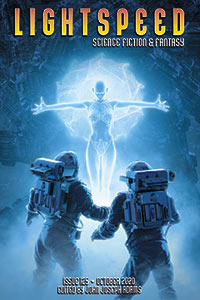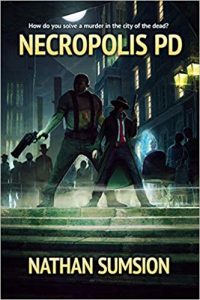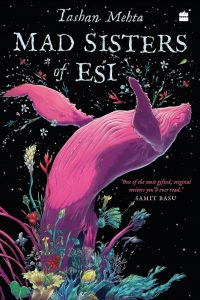Karen Burnham Reviews Short Fiction: Strange Horizons, BCS, Clarkesworld, and Lightspeed
 Strange Horizons 8/20
Strange Horizons 8/20
Beneath Ceaseless Skies 8/27/20
Clarkesworld 9/20
Lightspeed 10/20
At the end of August Strange Horizons celebrated its 20th anniversary. It continues to be a stand-out in the online fiction world, having survived many evolutions over time. Be sure to check out the editor’s choice stories featured on August 31, showcasing 20 years of history with just a few selections. Elsewhere in August it features “My Love, Our Lady of Slaughter” by Christine Lucas. Hecuba is part of an order that heals physical wounds with mental manipulative powers, but the same ability that can cause a wound to heal can cause a stroke. The soldiers that arrive seeking to command the powers of her lover, Ismene, are running a big risk, especially after potentially botching a job to give a young girl equivalent powers. The tension builds as we learn more about the women and their history and what Hecuba will have to do in the end. “Alone” by Emma Törzs is a character portrait of Alia, a researcher specializing in isotope-tracing archival feathers, who is trying to figure out the nesting grounds of the thought-to-be-extinct thick-billed curlew. She definitely has trouble relating to other humans, but her discovery about the curlews proves transformative in a most un-clichéd way.
Beneath Ceaseless Skies #311 has two pretty intense stories. “The Past, Like a River in Flood” by Marissa Lingen is set in a world of magic schools. One ex-faculty member returns, 20 years after a flood that jeopardized a warehouse of magical potions. The day itself was extremely stressful and traumatizing, but it turns out that “clean up” involved sealing the place up and hoping for the best…. Not the best strategy, it turns out. Then in “Doorway, Smile, Kiss, Fox” by Jeremy Packert Burke, the City is growing cancerously and the king is dangerously venal. The protagonist is a Mnemosyne, someone who bodily stores the history and memory of the City by drinking small amounts of treated blood from its best and brightest – but now the king is forcing blood on him weekly. The Mnemosyne enacts his own resistance in small, subtle ways.
Clarkesworld‘s September issue is full of stories that are interesting, complex, and difficult to summarize concisely. Lavie Tidhar‘s story “Blue and Blue and Blue and Pink” is an entry into the “incomprehensibly transformed region” subgenre, and the protagonist is a pilot who has been conducting clandestine trading missions across the boundary for an organized outfit. He thinks that by being careful he’ll be immune from whatever effect occasionally causes his fellow pilots to go terminally insane, but when an artifact of his childhood starts appearing, along with visions of his mother being uncharacteristically warm and loving, we suspect this isn’t going to end well for him. “What Remains of Maya Sankovy” by debut author G.D. Angier is set on a colony world. The narrator is Mother, a robot imprinted with the personality of a human to care for the crop of children born on this new world; the captain is the only largely unmodified human on the planet. They realize early on that the oceans contain some sort of organism that can have fatal effects in humans, but hope that they can keep the children away from the water…. It’s what happens after their hope is crushed that is most interesting.
Arula Ratnakar‘s “Lone Puppeteer of a Sleeping City” is a long story that has two woven plot lines. In one there are singular Daughter/Mother/Grandmother entities that follow each other’s roles sequentially. In the other Opal is an AI being trained to take over a city when all the inhabitants will be put in suspended animation, the only way to minimize their environmental impact and let the world recover. Central to this strand is Opal’s relationship with Eesha, a girl abandoned by her mother, who followed a lover taking a different path. She is being raised by two of the city’s great researchers with very different philosophies. This is Ratnakar’s second published story. The other also appeared in Clarkesworld last year, and the two couldn’t be more different – a good sign of her range.
“Certainty” by Isabel Lee imagines a researcher and assistant invited to tour a facility that is using supercomputers to trace the universe back to its tiniest seed and, assuming a deterministic world, predict everything about our world to the tiniest detail. There’s a lot of drama inherent in the concept, ramped up by past tensions between two directors and attraction between the two junior personnel. “Ask the Fireflies” by R.P. Sand appears to give us AI caretakers of a young girl, Alshea, on an extraterrestrial station where her father is the director and her mother a traveling interstellar celebrity. There are amusing warps of popular culture as the AIs play with the girl, but things take a dark turn when we realize that she’s really in a coma and the AI has to find a way to prevent her from being declared brain dead.
Nin Harris gives us a take on colonialism and race in “Every Plumage, Every Beak“, a world of garudas, apsaras, demons, and others. Saengdao’s people used to be subjugated, and she reacts very badly when her ward Timak asks her to pull a chariot to go confront the New Kingdom. They eventually both end up being co-opted into the New Kingdom’s affairs, but in very different ways. “The Book Reader” by Keishi Kajifune (translated by Toshiya Kamei) delves into Fahrenheit 451 territory in a world where most kids have information spoonfed to them by AR-providing nanobots and are not allowed to learn to read or practice imagination. This approach obviously doesn’t work for all children, and the protagonist’s friend is one of those whose body rejects the nanobots – this also means she can see what’s really happening in the world when things take a bad turn.
The lead science fiction story in October’s Lightspeed really had me turning the pages. “The Ambient Intelligence” by Todd McAulty imagines America decades from now, denuded by climate change and occasionally invaded by foreign powers. Now something appears to be trying to boil off Lake Michigan. Barry Simone is working with a clean-up organization after one of the wars, and he’s managed to stash a suit of high-end power armor. One of the AIs he works with, Zircon Border, realizes that Simone is the best bet to deal with a mining robot that’s gone rogue, killing some humans before retreating to a newly revealed shipwreck. The relationship between Simone and Zircon is well drawn and the adventure as they find the robot and discover why it’s gone rogue is entirely engaging. Jenny Rae Rappaport gives us “Everything and Nothing“, a lovely portrait of romance in the very far future that strays very far from the tropes where it starts.
On the fantasy side, “The Vampire of Kovácspéter” by PH Lee imagines an industrializing Hungarian town that would like to stop sacrificing daughters to the local vampire. They send off for a hero and he arrives. He learns the vampire’s history (and why it’s daughters being sacrificed instead of, say, sheep) but he really doesn’t want to get sucked into their drama. Then in “Everquest” by Naomi Kanakia we imagine an unhappy young man named Gopal who is much happier as the wood elf Gayatri in games. He’s forced to stop playing, until he picks it back up in adulthood, and seems to undergo a metamorphosis. It’s an interesting examination of personal expression in the virtual and real worlds.
Recommended Reading
“My Love, Our Lady of Slaughter”, Christine Lucas (Strange Horizons 8/20)
“The Ambient Intelligence”, Todd McAulty (Lightspeed 10/20)
“Lone Puppeteer of a Sleeping City”, Arula Ratnakar (Clarkesworld 9/20)
Karen Burnham is an electromagnetics engineer by way of vocation, and a book reviewer/critic by way of avocation. She has worked on NASA projects including the Dream Chaser spacecraft and currently works in the automotive industry in Michigan. She has reviewed for venues such as Locus Magazine, NYRSF, Strange Horizons, SFSignal.com, and Cascadia Subduction Zone. She has produced podcasts for Locusmag.com and SFSignal.com, especially SF Crossing the Gulf with Karen Lord. Her book on Greg Egan came out from University of Illinois Press in 2014, and she has twice been nominated in the Best Non Fiction category of the British SF Awards.
This review and more like it in the November 2020 issue of Locus.
 While you are here, please take a moment to support Locus with a one-time or recurring donation. We rely on reader donations to keep the magazine and site going, and would like to keep the site paywall free, but WE NEED YOUR FINANCIAL SUPPORT to continue quality coverage of the science fiction and fantasy field.
While you are here, please take a moment to support Locus with a one-time or recurring donation. We rely on reader donations to keep the magazine and site going, and would like to keep the site paywall free, but WE NEED YOUR FINANCIAL SUPPORT to continue quality coverage of the science fiction and fantasy field.
©Locus Magazine. Copyrighted material may not be republished without permission of LSFF.






